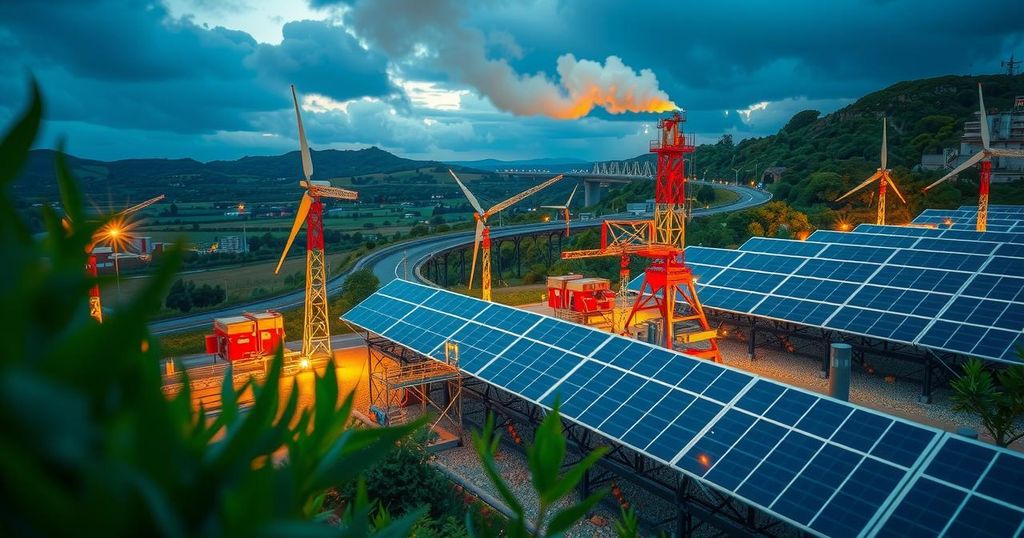The CCPI highlights significant growth in renewable energy among major emitting nations; however, a continued dependence on fossil fuels persists, with numerous countries, including Iran and Saudi Arabia, showing minimal progress. Positive advancements, particularly in Denmark and the UK, contrast sharply against setbacks experienced by nations like Argentina. The report underscores the vital necessity for accelerated emissions reductions to meet global climate goals.
In the latest Climate Change Performance Index (CCPI) released by Germanwatch, NewClimate Institute, and CAN International, notable advancements in renewable energy were observed among many high-emission nations. Despite the growth, an alarming trend persists as numerous countries continue to cling to fossil fuel dependency, particularly in the natural gas sector. This index evaluates the 64 largest emitters which collectively account for approximately 90% of global emissions. While 61 of these nations have increased renewable energy shares, 29 countries still display low or very low emissions trends. The absence of high-ranking countries signals a critical need for accelerated climate action to adhere to the Paris Agreement’s temperature objectives.
Denmark achieves the top rank among nations assessed, alongside the Netherlands in second place and the United Kingdom improving to sixth due to significant policy shifts including a coal phase-out. In stark contrast, Argentina’s recent political changes have triggered a decline in its climate performance, highlighting the negative impacts of local governance on emissions policies. Furthermore, the lowest-ranked countries—Iran, Saudi Arabia, the United Arab Emirates, and Russia—remain heavily reliant on fossil fuels, each maintaining renewable energy shares below 3%.
Jan Burck of Germanwatch emphasized that while many nations acknowledge the viability of renewables, there exists substantial resistance from fossil fuel interests. He called for countries to avoid deeper entrenchment in fossil fuel dependency. Prof. Niklas Höhne from NewClimate Institute echoed the urgency to significantly reduce emissions, stating that the time to act is critical to avert severe climate change impacts.
China, as the largest global emitter, ranks 55th, indicating a significant reliance on coal alongside an unprecedented upsurge in renewable energy capacities. Conversely, the United States occupies the 57th position, illustrating a need for heightened investments in clean energy and a cessation of fossil fuel subsidies, with the upcoming elections potentially influencing future climate policies. Among G20 nations, the UK and India show strong performance, with numerous others falling behind, accounting for a large portion of worldwide emissions.
The European Union collectively ranks 17th, showcasing positive impacts from initiatives like the Green Deal. With no EU country rated very low, progress persists despite Germany’s decline in rankings. As Janet Milongo from the Climate Action Network noted, disparities in renewable energy development highlight significant global inequities, stressing the necessity for equitable financing to support a just transition to renewable sources for all nations.
The Climate Change Performance Index (CCPI) serves as a critical tool for evaluating the climate-related performance of the world’s largest emitters. Each year, the CCPI assesses factors such as emissions levels, integration of renewable energy into national energy mixes, and overall climate policies enacted by countries. The present report indicates that although global investment in renewable energy is increasing, fossil fuel reliance remains high in numerous countries, particularly those heavily involved in oil and gas production. This juxtaposition of progress and regression is pivotal in understanding the global climate strategy landscape, especially in light of the goals set forth by the Paris Agreement.
In conclusion, while the expansion of renewable energy sources in high-emitting nations reflects encouraging progress, the persistent reliance on fossil fuels represents a critical challenge that must be addressed. The CCPI results underscore the urgent need for comprehensive climate strategies and reinforced commitments from both leading and lower-performing countries. Ensuring that nations prioritize their climate obligations is necessary to safeguard the future health of our planet and mitigate the effects of climate change effectively.
Original Source: www.germanwatch.org






